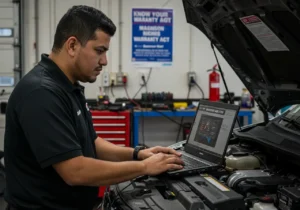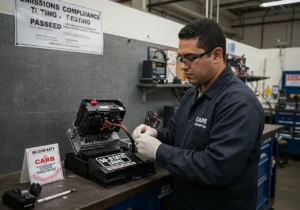Engine tuning is the process of adjusting or reprogramming a vehicle’s Engine Control Module (ECM) to influence performance, fuel efficiency, and emissions. For many car enthusiasts and everyday drivers alike, tuning represents an opportunity to unlock hidden potential from their vehicles—whether it’s smoother acceleration, improved gas mileage, or simply a driving experience that feels more responsive.
Yet, misinformation about engine tuning is widespread. Myths have circulated for years, causing hesitation and confusion among vehicle owners. Common beliefs claim that all tuning voids warranties, carries high risks, or is only for those chasing more horsepower. These misconceptions can steer you away from making informed decisions—or worse, lead to costly mistakes.
This article tackles the Top 5 Engine Tuning Myths—Busted by Experts. Each myth is dissected with clear explanations and real-world examples gathered from seasoned professionals in the field. You’ll find practical insights designed to empower you with accurate information before considering any changes to your engine’s software.
Myth 1: ECM Tuning Always Voids Warranty
Many people believe that any type of ECM tuning will automatically void their vehicle’s warranty. This fear often makes owners give up on the idea of improving performance or efficiency, worried that even one modification could cancel their entire warranty.
Understanding Warranty Implications
- Manufacturers cannot legally void the entire warranty simply because ECM tuning has been performed.
- The Magnuson-Moss Warranty Act in the United States, for example, states that a dealer must prove that modifications—such as an ECU remap—directly caused the failure in question before denying coverage.
- If a tuned ECU leads to an engine or transmission issue, only claims related to those affected systems may be denied. Coverage for unrelated parts (such as air conditioning or electronics) remains intact.
Warranty-Safe Tuning Options
Not all ECM tuning puts your warranty at risk. Several companies offer warranty-safe tuning options specifically engineered to minimize impact on factory settings and avoid triggering manufacturer flags during routine servicing.
- Some tuners provide “flash and return” services where the original software can be restored before dealership visits.
- Others use hardware modules or piggyback systems that leave no trace once removed.
- Select products are developed in collaboration with automakers or are designed within OEM safety parameters, offering peace of mind for owners concerned about warranty implications.
“Warranty-safe tuning options exist, but it’s crucial to verify compatibility with your specific make and model—and always document any changes.”
The landscape of ECM tuning has shifted toward transparency and risk mitigation. Knowing your rights under warranty law and selecting reputable providers helps ensure you don’t lose valuable coverage unnecessarily.
ECM tuning varies widely in both approach and outcome, which brings up another common misconception: that all ECM tunes are created equal.
Myth 2: All ECM Tuning is the Same
A common misconception about ECM tuning is that it provides uniform results and benefits, leading some to believe they can select any generic tune without considering their specific needs or goals. This couldn’t be further from the truth.
Different Types of ECM Tunes
Various types of ECM tunes exist, each catering to different performance levels and vehicle setups. For instance, a Stage 1 tune typically involves minor modifications and is designed for use with stock vehicles, offering modest enhancements in power and efficiency. On the other hand, a Stage 2 tune requires more extensive modifications like upgraded exhaust systems or intake kits and delivers significant performance gains.
Customized Tuning for Specific Needs
Customizing an ECU tune according to individual preferences and driving style is crucial. For example, a daily driver might benefit from a tune that enhances fuel efficiency and smoothness, whereas a track car would require a more aggressive setup focusing on maximum horsepower and torque.
Varied Tuning Goals
The goals of ECM tuning are varied. Some drivers seek heightened performance for racing scenarios, while others aim for better fuel economy or reduced emissions. Understanding these distinctions helps ensure that the tuning process aligns with your vehicle’s intended use.
In conclusion, not all ECM tuning is created equal. Customization based on your specific needs ensures you get the most out of your vehicle while achieving your desired outcomes—whether that’s enhanced performance, improved fuel efficiency, or compliance with emissions standards.
Myth 3: ECM Tuning is Only for Performance Enhancement
Many people believe that ECM tuning is only done to increase horsepower and torque. While it’s true that performance gains are often the main focus, there’s much more to modern engine calibration than just boosting power.
Fuel Efficiency Tuning
Fuel efficiency tuning has become a major focus for both enthusiasts and everyday drivers. By optimizing fuel maps through precise ECU calibration, tuners can create a more efficient combustion process. This means you get improved miles per gallon without sacrificing drivability or response. Commuters benefit from fewer trips to the gas pump, especially when city and highway driving conditions are considered during the tuning process.
Emissions Reduction Tuning
Emissions reduction tuning represents another area where ECM modification plays a crucial role. Certain tunes are engineered specifically to minimize harmful exhaust gases by adjusting parameters such as air-fuel ratios, ignition timing, and aftertreatment system operation. Modern diesel vehicles, for instance, often require calibration updates to stay compliant with evolving emissions standards while still delivering adequate power output for towing or hauling.
Engine Life Optimization
The scope of ECM tuning also includes engine life optimization. By smoothing out factory inconsistencies or dialing back overly aggressive OEM parameters, a custom tune can reduce engine stress and wear over time. This approach appeals to those who prioritize longevity and reliability just as much as spirited performance.
Experts featured in “Top 5 Engine Tuning Myths—Busted by Experts” consistently highlight these overlooked benefits. A well-calibrated ECU adapts not only to your performance preferences but also to your environmental priorities and long-term maintenance goals. This broader perspective on tuning underscores why a one-size-fits-all approach rarely delivers optimal results.
Myth 4: ECM Tuning Poses a High Risk to Engines
Many vehicle owners worry about the potential engine damage that could result from improper or poorly executed ECU tunes. This concern has contributed to the myth that ECM tuning inherently poses a high risk to engines.
Improper tuning, often performed by amateurs or those lacking sufficient knowledge about engine dynamics, can indeed push the engine beyond safe operational limits. This can lead to severe consequences, such as premature wear and tear or even catastrophic engine failure. Common issues from amateur tuning include incorrect air-fuel ratios, overly aggressive timing advances, and inadequate cooling strategies.
The Importance of Professional Tuning
Seeking professional help from experienced tuners is crucial for mitigating these risks. Professional tuners have extensive knowledge of engine parameters and understand how to balance performance enhancements with reliability. They use sophisticated equipment and software to ensure that any modifications align with the specific characteristics of your engine.
What Professional Tuning Involves
Professional tuning involves:
- Thorough Diagnostics: Identifying the current state of your engine before making any adjustments.
- Customized Calibration: Tailoring the tune to your vehicle’s specifications and intended use.
- Safety Margins: Incorporating conservative limits to prevent overstressing engine components.
The Benefits of Professional Tuning
By opting for professional tuning services, you can significantly reduce the risks associated with ECM tuning and enjoy improved performance without compromising engine longevity.
 Myth 5: ECM Tuning is Illegal
Myth 5: ECM Tuning is Illegal
Legal aspects of ECM tuning create confusion for many vehicle owners. The myth that all ECM or ECU modifications are outright illegal has gained traction, especially with the growing focus on emissions compliance. In reality, the legality of ECM tuning depends heavily on regional laws and how the modifications affect a vehicle’s emissions output.
Key points to consider about the legal status of ECM tuning:
- Jurisdiction matters. In the United States, the Environmental Protection Agency (EPA) enforces strict emissions regulations. Any software modification that disables or alters factory emissions controls—such as catalytic converter monitoring or EGR operation—violates federal law. This can result in heavy fines if discovered during inspections or random checks.
- Not all countries treat tuning equally. Some regions in Europe allow certain types of ECU remapping if the modified car still passes annual MOT or TÜV inspections for roadworthiness and emissions. In Australia and Canada, regulations also vary by state or province.
- Emissions compliance is not optional. Tune files that ensure all original emissions systems remain functional and within legal limits are generally considered compliant. Many reputable tuners now offer “emissions-friendly” or “50-state legal” tunes designed to pass standardized testing procedures, such as California’s CARB certification.
“It’s not tuning itself that’s illegal—it’s bypassing required emissions controls,” explains James, a certified automotive calibrator.
Common misconceptions include:
- Believing any change to engine management instantly makes a vehicle illegal for street use.
- Assuming all tuners ignore environmental laws when, in fact, responsible professionals prioritize compliance.
Selecting a tuner who understands both performance goals and local legal requirements is key. When considering an ECU upgrade, always verify that the modifications align with your region’s emissions standards to avoid unnecessary legal trouble.
Expert Insights on Engine Tuning Myths
Industry professionals consistently highlight the importance of separating fact from fiction when it comes to ECM tuning. Drawing from years of hands-on experience, their expert opinions on engine tuning myths reveal several recurring themes that shape responsible tuning practices.
Key Insights from Experts:
- Warranty Concerns: Leading tuners clarify that while some warranty claims may be affected by ECU modifications, a blanket voiding of the entire vehicle warranty is rare. Most manufacturers require proof that the modification directly caused a failure before denying coverage.
- Not All Tunes Are Equal: Experts point out significant differences between generic “off-the-shelf” tunes and custom calibrations tailored to the driver’s needs, such as those provided by a Cobb Accessport. Tuning should align with your goals—daily drivability, racing applications, improved fuel economy, or emissions compliance.
- Risk Management: Professional tuners stress the importance of technical expertise. Safe power gains are achievable when modifications respect factory safety parameters. Amateur tuning or chasing extreme numbers without proper data can put your engine at risk. For instance, power mods in modern cars should be approached with caution and knowledge.
- Legal Compliance: Specialists continually remind car owners to check local laws and emissions standards before pursuing any ECM modification. Compliance with regional regulations is non-negotiable for both safety and legal peace of mind.
“The best results come from working with reputable, transparent tuners who understand both the performance potential and legal boundaries,” says one industry veteran.
Relying on trusted professionals who stay current with technology and regulations brings clarity to the top 5 engine tuning myths list, empowering you to make informed decisions through every stage of your tuning journey.
Conclusion
Engine tuning remains a powerful way to unlock your vehicle’s true potential, but misinformation can hold you back. The Top 5 Engine Tuning Myths—Busted by Experts demonstrates that not every warning you hear is grounded in fact.
- Don’t let debunked engine tuning myths prevent you from accessing improved performance, better fuel efficiency, or reduced emissions.
- Modern ECUs offer safe and effective opportunities—when handled by reputable professionals who follow legal and warranty guidelines.
- Rely on expert recommendations: seek tuners with proven track records, transparent processes, and a commitment to compliance.
Trusting the right source makes all the difference between risky experimentation and reliable gains.
By staying informed and choosing wisely, you’ll enjoy the benefits of engine tuning without falling for common misconceptions.



 Myth 5: ECM Tuning is Illegal
Myth 5: ECM Tuning is Illegal